Every day, thousands of people in the United Kingdom are becoming cryptocurrency holders, but with that new ownership comes a pressing question: where can one keep crypto safely? Nearly 36% of UK crypto owners worry about losing access to their assets, while 40% of crypto owners still don’t fully trust that the technology is safe. Without a reliable solution, even a single forgotten password or misplaced recovery phrase can mean permanent loss, turning digital opportunity into irreversible risk.
This is where cryptocurrency wallets, like the one offered by Coinbase, become essential. Many wallets suffer from confusing setups, limited support in the UK, unclear fees, or a lack of features, raising questions like: Is this wallet truly secure? Can it be used with NFTs or DeFi platforms? Does it cost more than it says? These unresolved doubts often drive users to seek out trusted, beginner-friendly options with a strong reputation. Here’s where this Coinbase wallet UK review steps in. We’ve provided a comprehensive and structured walkthrough of Coinbase Wallet, explaining how it works, breaking down its features, pros and cons, fee structure, security safeguards, and its fit for different types of users across the United Kingdom.
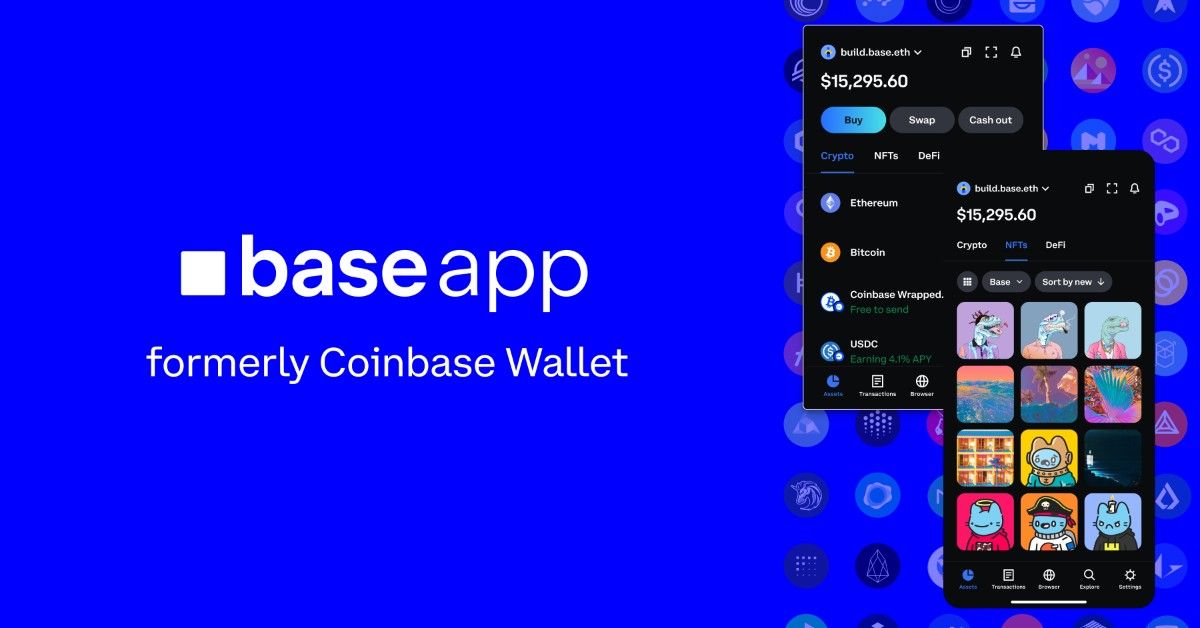
A Quick Overview of the Coinbase Wallet
The Coinbase Wallet has evolved from a simple Ethereum-based project into one of the most widely recognised self-custody wallets in the crypto industry. Originally launched in 2017 as Toshi, it was designed as a mobile gateway to the world of decentralised applications. A year later, it was rebranded to Coinbase Wallet, signaling a broader vision: to become a secure, beginner-friendly solution for holding, sending, and exploring digital assets beyond Ethereum. From that point, the wallet expanded its scope, supporting Bitcoin, Litecoin, and Bitcoin Cash in 2019, introducing username-based transfers in 2020, and steadily adding new networks such as Solana, Polygon, and Avalanche to give users wider access to the Web3 ecosystem. Over time, it evolved into more than just storage; it became a personal toolkit for crypto participation, including functions such as buying tokens with fiat, staking Ethereum, or managing NFTs. The Coinbase cryptocurrency wallet became, for many, the default entry point into digital asset management.
The ‘A New Day One’ event in July 2025 became the stage for Coinbase to unveil the wallet’s complete rebrand. The familiar Coinbase Wallet transformed into the Base App, a shift designed to reflect how people interact with the internet today. Instead of being just a place to hold crypto, the Base App became an all-in-one “on-chain everything app,” combining social feeds, private messaging, trading, payments, and mini-apps within one seamless interface. Built on Coinbase’s own Base chain, an Ethereum Layer-2 network, it also gained technical improvements such as the Flashblocks upgrade, cutting block times from two seconds to around 200 milliseconds. This change made in-app activity feel instant, whether sending USDC, posting content, or accessing DeFi tools.
The difference between the old and the new is striking. While the earlier wallet was focused on transactions and asset management, the Base App blends financial utility with everyday interaction. Opening the app today for users can mean checking tokens, sending money, chatting with contacts, or even publishing a post, much like carrying a physical wallet that now doubles as a phone, a payment card, and a notebook in one. Existing users of the Coinbase Wallet are gradually being transitioned into this new ecosystem, ensuring continuity while integrating more functionality.

How Does the Coinbase Wallet Work in the UK?
The Coinbase Wallet in the United Kingdom has evolved into the Base App, a comprehensive platform that combines cryptocurrency management, trading, and social interaction in one seamless experience. The Base App functions as a self-custody wallet, giving users full control over their private keys and holdings while supporting a wide range of cryptocurrencies and decentralised applications (dApps). For UK users, integration with the Base Layer 2 network ensures faster and more cost-effective transactions, eliminating the frustration of high fees and slow processing often experienced on traditional blockchains.
A notable feature is its social trading functionality, which allows users to follow experienced traders, share strategies, and learn in a collaborative environment, particularly valuable for beginners exploring the complex crypto ecosystem in the UK.
Legally, Coinbase operates under the oversight of the UK’s Financial Conduct Authority (FCA) and holds a Virtual Asset Service Provider (VASP) registration, ensuring compliance with anti-money laundering and financial regulations. While the platform prioritises security and regulatory adherence, users are encouraged to stay informed about ongoing compliance requirements to maintain a safe, fully compliant experience.
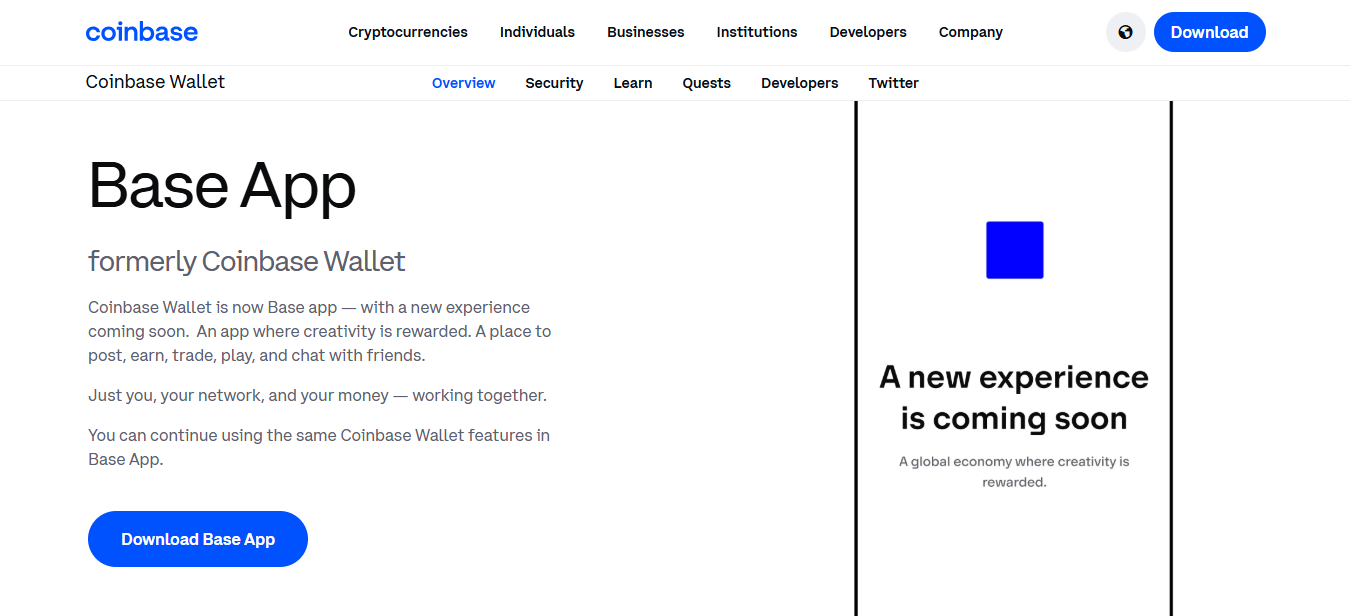
Is Coinbase Crypto Wallet a Good Option in the UK?
The question of Coinbase Wallet’s value in the UK can best be answered by considering both its original appeal and the recent improvements that expand its scope. Traditionally, Coinbase Wallet earned credibility for offering self-custody, intuitive design, and broad support for thousands of tokens and NFTs, features that provided newcomers with a simple yet reliable way to secure their assets. More recently, Coinbase has merged advanced capabilities into its base app, such as social trading, staking options, and seamless bridging between networks. This shift reduces the need to juggle multiple platforms, allowing a user to store, trade, and interact with DeFi ecosystems within a single environment. In practical terms, it means a professional receiving crypto payments or a beginner exploring NFTs can manage their portfolio with less friction. When viewed in the context of the UK’s growing but tightly regulated crypto market, Coinbase Wallet stands out as a practical option, offering both compliance-friendly credibility and the flexibility needed for everyday use.
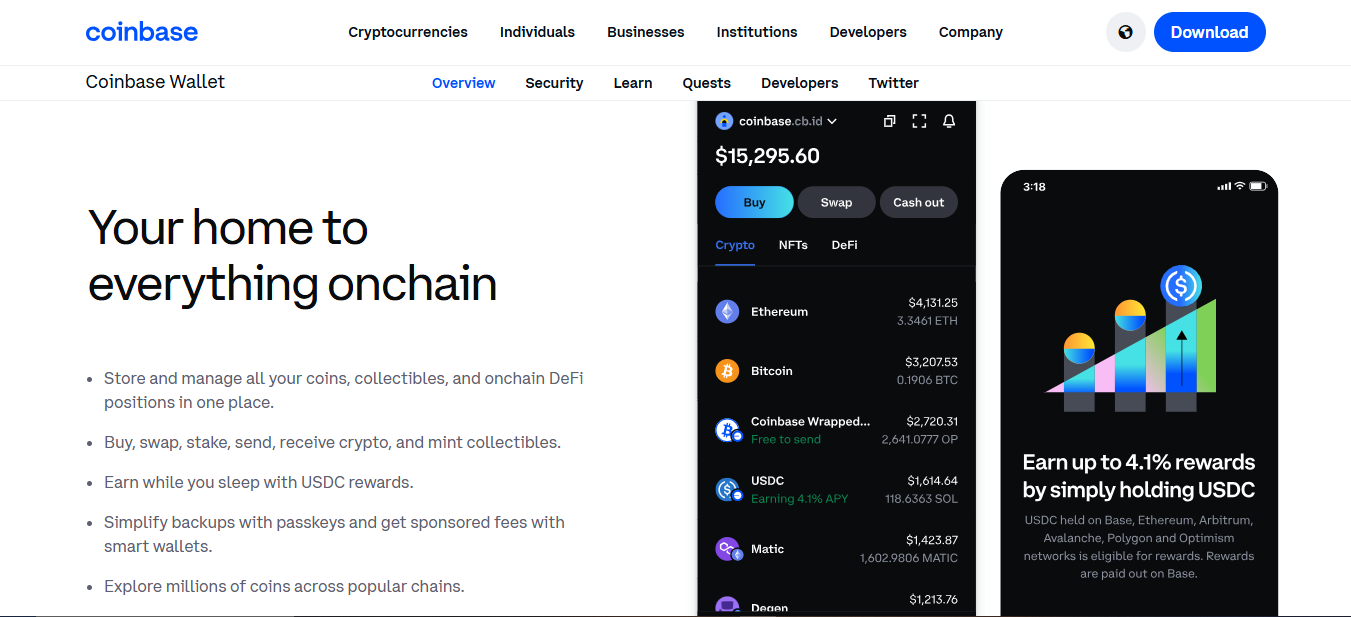
Key Features of the Coinbase Wallet for UK users
- Self-Custody and Private Key Control
Users retain complete ownership of their assets through private key management, ensuring funds are not dependent on third-party custody. - Integration with Base App
The wallet connects directly to the Base Layer-2 network, offering faster, low-cost transactions and access to an expanding ecosystem of decentralised applications (dApps). - Multi-Asset Support
It supports thousands of cryptocurrencies, tokens, and stablecoins, as well as full compatibility with Ethereum and EVM-based assets. - NFT Storage and Management
It provides a dedicated interface for storing, displaying, and trading non-fungible tokens (NFTs), with Base integration improving transaction efficiency. - dApp Browser and DeFi Access
It enables direct interaction with decentralised applications, including DeFi protocols for staking, lending, and liquidity provision. - In-App and Social Trading
The wallet integrates features that allow users to swap tokens directly within the app and explore social trading tools, including following the on-chain activity of other wallets for informed decision-making.
Is Coinbase Wallet Accessible on Both iOS and Android Devices for UK Users?
Coinbase Wallet is fully accessible to UK users on both iOS and Android devices, as the application can be downloaded directly from the Apple App Store and the Google Play Store, ensuring seamless access across major mobile platforms. This broad compatibility enables UK traders to manage, store, and interact with their digital assets conveniently on the device of their choice.

Coins and Tokens Supported by Coinbase Wallet
Coinbase Wallet provides support for a wide range of cryptocurrencies, making it a versatile option for traders and investors. The wallet is compatible with major coins such as Bitcoin (BTC), Ethereum (ETH), Litecoin (LTC), and Bitcoin Cash (BCH), while also extending support to thousands of ERC-20 tokens on the Ethereum network. In addition, it accommodates assets from multiple blockchains, including Polygon, Avalanche, Solana, and BNB Chain, ensuring access to a broad ecosystem of decentralised applications. Beyond coins and tokens, Coinbase Wallet also allows users to securely store and manage NFTs and digital collectibles directly within the app.
Coinbase Wallet Fees Explained for UK Users
For users in the United Kingdom, Coinbase Wallet is accompanied by a structured fee framework that varies depending on the type of transaction. Depositing funds via Faster Payments in GBP is generally free of charge. Trading and token swaps carry both a spread fee, typically around 0.60% to 1.20%, applicable to users executing trades on Coinbase Exchange and connected through their linked wallet. More active traders using Coinbase Advanced benefit from lower rates, with maker fees scaled by trading volume. Transactions involving NFTs incur variable blockchain network (gas) fees, determined by congestion rather than Coinbase itself. For those using the Coinbase Card, there are no additional transaction fees, although a small conversion spread is applied when spending in non-crypto currencies.

FAQs
Is Coinbase Wallet Suitable for Storing Large Amounts?
Coinbase Wallet can be considered suitable for holding significant sums due to its self-custody framework, where users maintain full control of their private keys rather than relying on third-party custody. Security is reinforced through integration with Coinbase’s regulated ecosystem and compatibility with hardware wallets, offering additional layers of protection. However, responsibility for safeguarding recovery phrases still rests with the user.
How User-Friendly is Coinbase Wallet’s Customer Support in the UK?
Coinbase Wallet’s customer support in the UK is reasonably accessible, offering assistance through live chat, an extensive knowledge base, and via email. Its structured resources and prompt response times enhance usability, though limited direct phone support slightly narrows its overall convenience.
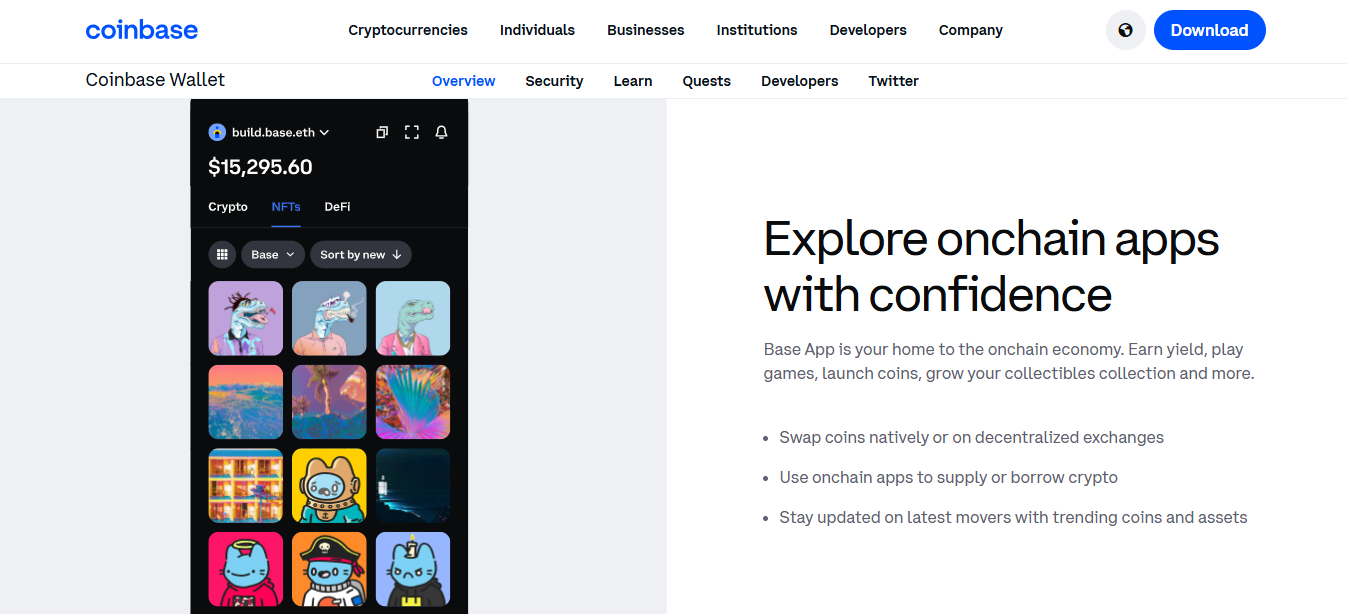
Is Coinbase Wallet Compatible with Hardware Wallets?
Coinbase Wallet is compatible with leading hardware wallets such as Ledger, allowing users to integrate offline storage with on-chain functionality. This ensures an additional layer of protection by keeping private keys offline while still allowing seamless interaction with dApps, NFTs, and assets. For UK users, this integration strengthens security while preserving flexibility in everyday transactions.
How Safe is Coinbase Wallet for UK Users?
Coinbase Wallet offers a high level of safety for UK users, combining advanced encryption, self-custody of private keys, and integration with Coinbase’s Base network for secure transactions. Its compliance with Financial Conduct Authority oversight further enhances reliability, making it a trustworthy choice for safeguarding digital assets.
What is the Best Alternative to the Coinbase Wallet for UK Users?
A strong alternative to Coinbase Wallet for UK users is MetaMask, particularly in light of Coinbase’s transition to the Base App. While the Base App integrates trading, messaging, and social features, MetaMask excels with its seamless connectivity across Ethereum, Layer-2 networks, and thousands of decentralised applications. Its open-source framework, advanced DeFi compatibility, and NFT management tools position it as a competitive, flexible choice.
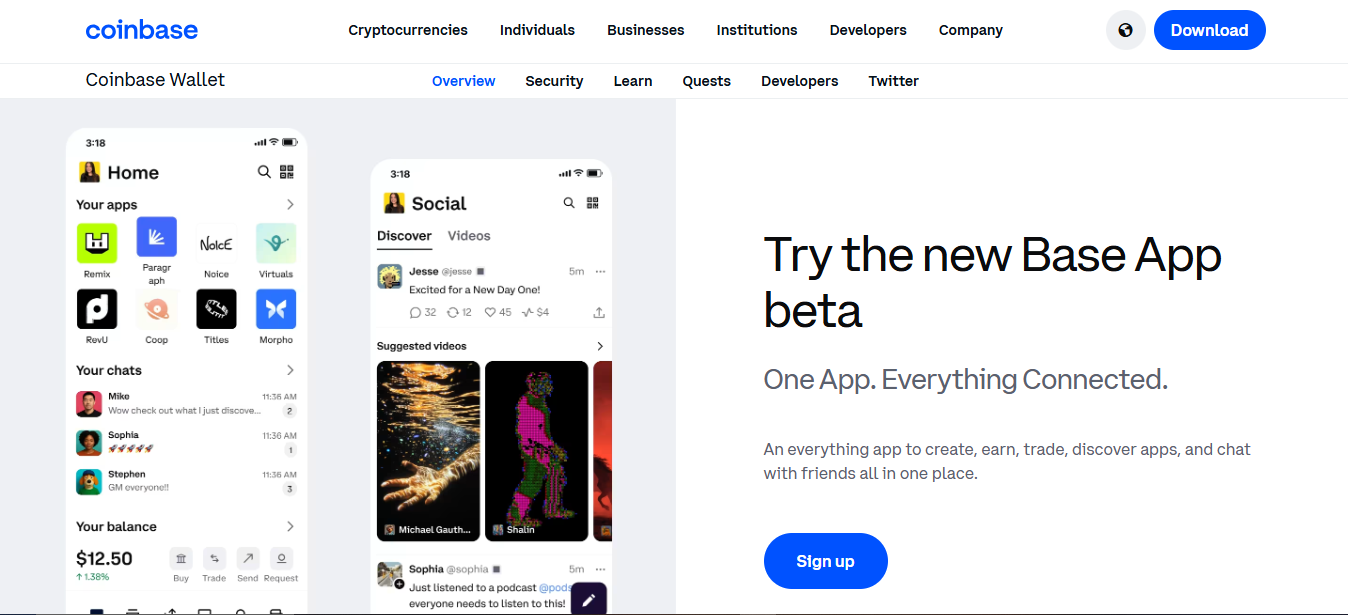
Conclusion
A prudent step for anyone considering digital asset storage is to remain informed and proactive about security practices beyond the wallet itself. Regularly updating devices, safeguarding recovery phrases offline, and monitoring regulatory changes can preserve both safety and compliance. This Coinbase wallet honest review underscores that diligence paired with reliable tools can secure long-term value.





 usdt
usdt xrp
xrp

